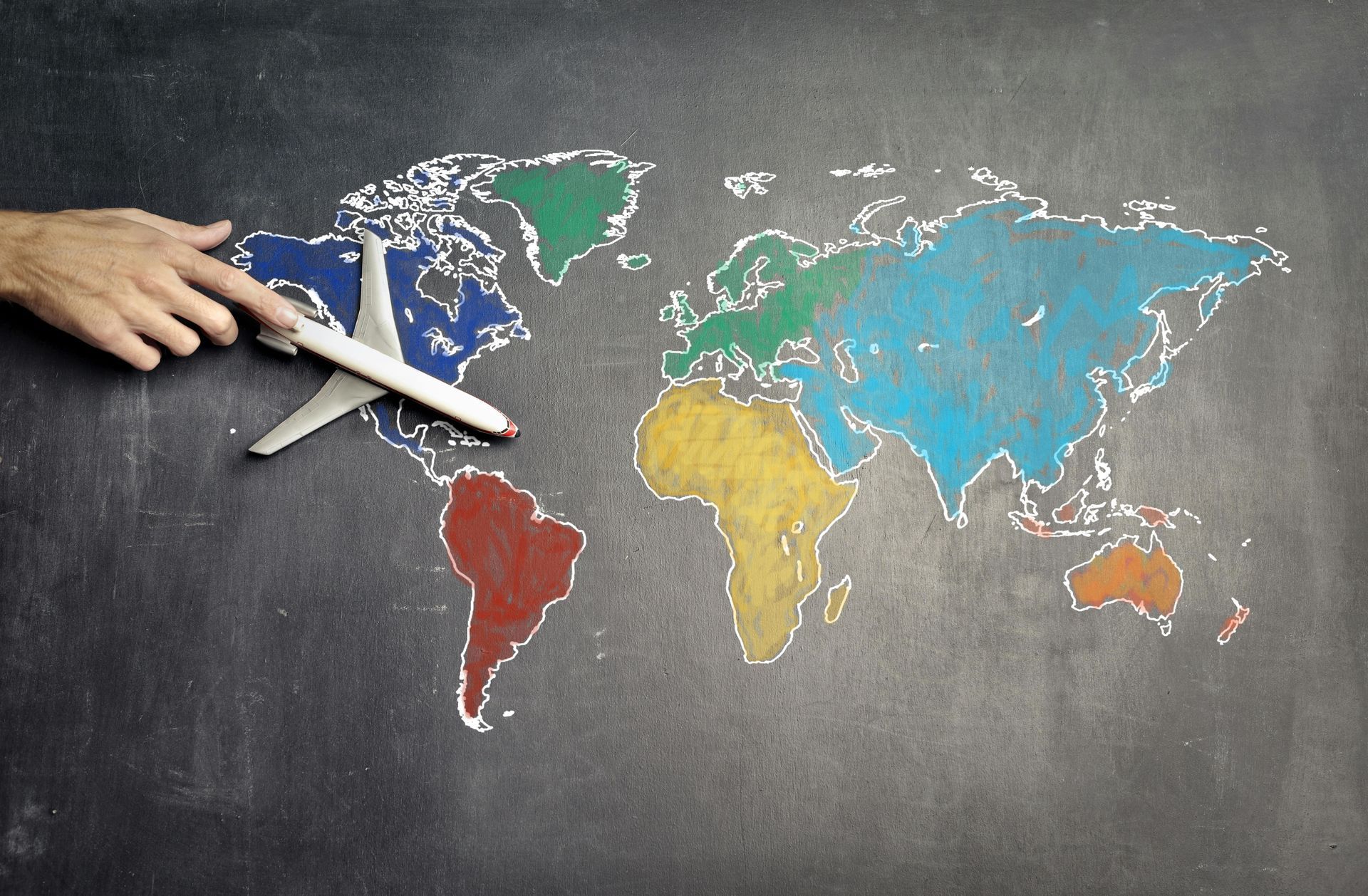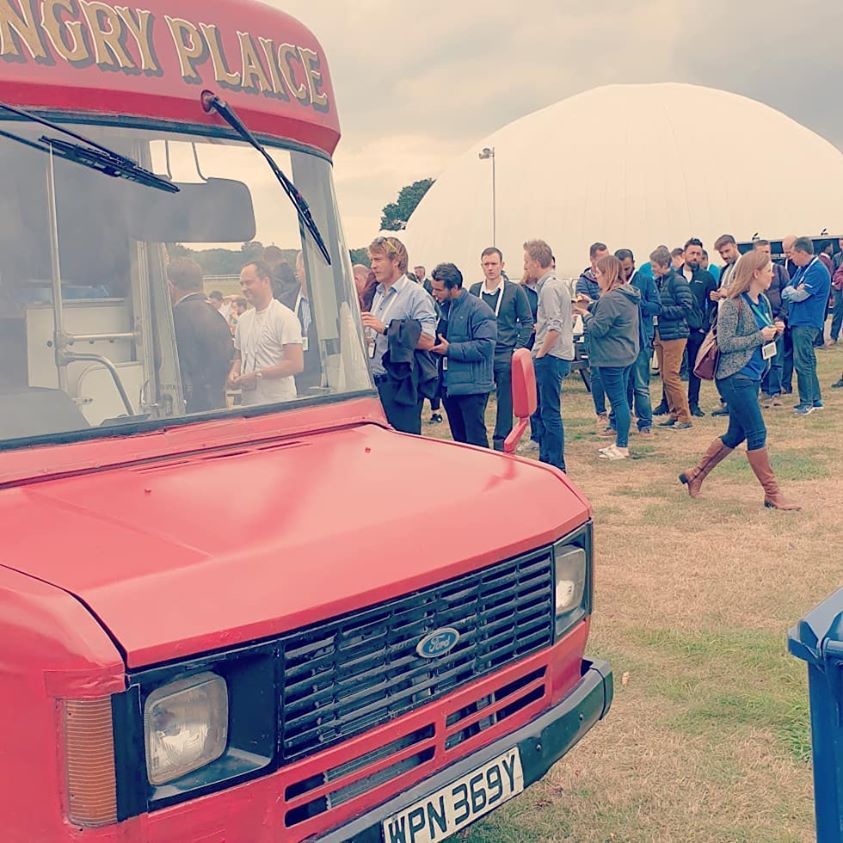This article explores the advantages and disadvantages of virtual and in-person events while delving into hybrid models that blend both. It provides insights to help event planners maximise engagement, reach, and connection regardless of the chosen format.
Virtual vs. In-Person Events: What's the Future?
Virtual vs. In-Person Events: What's the Future?
The rapid evolution of technology is reshaping the event planning landscape offering new tools and opportunities to enhance the attendee experience and streamline logistics. With advancements in virtual reality, artificial intelligence, and big data analytics, event planners can now create more personalised and engaging events than ever before.
Virtual reality (VR) allows attendees to immerse themselves in interactive environments that were previously unimaginable. Whether it's a virtual walkthrough of a conference venue or an augmented reality display showcasing product features, VR technology brings a new dimension to event experiences, making them more captivating and memorable.
Artificial intelligence (AI), on the other hand, is revolutionising how organisers handle various aspects of event planning. AI-powered chatbots provide real-time assistance to attendees by answering questions and providing information instantly. Additionally, machine learning algorithms analyze attendee behavior patterns to tailor content recommendations and networking opportunities according to individual preferences.
Moreover, leveraging big data analytics enables planners to make informed decisions based on comprehensive insights into audience demographics and interests. By analysing this wealth of information collected through registration systems or social media engagement metrics, organizers can fine-tune marketing strategies for maximum impact while ensuring events remain relevant to their audiences' needs.
Furthermore, hybrid events—which combine both physical presence with virtual participation—are becoming increasingly popular as they offer flexibility for attendees who cannot be present physically yet wish still want access valuable content remotely—a trend accelerated during global disruptions like pandemics when attendance numbers shift online dramatically due societal constraints preventing face-to-face interactions temporarily impacting businesses globally forever changing normative expectations around future gatherings too!
There are a number of pros and cons of virtual events, cost-effectiveness due to reduced travel and venue expenses is one of the primary advantages of virtual events. Organisers can reach a wider audience without the logistical and financial burdens associated with physical gatherings. Additionally, virtual events often have shorter lead times in terms of planning and execution, allowing for more frequent updates or changes in programming.
However, there are also challenges to consider. One major disadvantage is the lack of personal interaction that comes naturally with in-person events. Networking opportunities can be limited as participants miss out on serendipitous meetings that occur during coffee breaks or social hours at live conferences. Furthermore, technical issues such as connectivity problems or platform unfamiliarity may hinder smooth participation for some attendees.
Content engagement levels might also vary between in-person and online formats; for example, audiences watching from home might face distractions not present at a conference center environment designed specifically to capture undivided attention.
The hybrid model attempts to bridge these gaps by combining elements from both domains: offering real-time experiences while still providing remote access options fosters inclusivity among diverse participant groups worldwide regardless geographic location constraints they may face previously restricted them attending personally before advent current digital integration advancements made possible today!
There are many advantages of In-Person Events these include the opportunity for face-to-face networking, allowing participants to build relationships and connections more effectively. Personal interactions often result in a depth of engagement that is difficult to replicate in virtual settings, where communication cues can be misinterpreted or missed altogether. The sensory experience of being physically present at an event also enhances learning and memory retention, as participants can directly engage with speakers, exhibits, and demonstrations.
Another significant advantage is the immersive environment provided by conference spaces designed specifically for collaboration and knowledge exchange. These venues are typically equipped with high-quality audio-visual equipment and comfortable seating arrangements that facilitate concentration free from domestic distractions like household chores or unexpected interruptions.
In-person events also allow organisers to incorporate dynamic elements such as live performances, interactive workshops, or hands-on activities—components that are challenging to translate into a digital format without losing impact. Moreover, spontaneous discussions during coffee breaks or shared meals often lead to serendipitous discoveries and innovative ideas.
Finally, attendees may feel a stronger sense of commitment when participating in-person due to the effort involved in travel planning and attendance; this investment frequently translates into heightened enthusiasm for event content which benefits both participant satisfaction levels as well organizational outcomes related increased brand loyalty longer-lasting impressions post-event phases ultimately resulting greater overall success metrics achieved compared solely virtual alternatives alone.
Hybrid Events are a blend of both worlds combining the advantages of in-person and virtual formats to create a flexible and inclusive experience for attendees. By offering both live and online participation options, hybrid events accommodate varying preferences and needs, thereby expanding their reach to a global audience that may not have been able to attend otherwise. This approach maximises engagement by allowing participants to choose their preferred method of involvement.
Incorporating digital tools into the event structure also enables organisers to analyse data more efficiently—tracking attendance patterns, gathering real-time feedback, and measuring participant interactions with content. These insights are invaluable for refining future events based on attendee interests and behaviours.
Moreover, hybrid formats promote sustainability by reducing the carbon footprint associated with travel while maintaining essential face-to-face networking opportunities critical for business development. With careful planning and execution, technical challenges such as connectivity issues or platform restrictions can be effectively managed ensuring seamless integration between physical venues streaming platforms alike throughput duration entire lifecycle each event enjoy successful outcomes similar purely physical gatherings counterpart numerous added benefits afforded bridging traditional modern approaches together.
There are technological advancements driving change in Event Management, in recent years, the event management industry has witnessed a significant transformation driven by technological advancements. These innovations have reshaped how events are planned, executed, and experienced by attendees across the globe.
Virtual Reality (VR) and Augmented Reality (AR): VR and AR technologies have introduced immersive experiences that allow participants to engage with content in new and exciting ways. From virtual venue tours to interactive product demonstrations, these tools enhance engagement levels while offering limitless creative possibilities for organisers.
Artificial Intelligence (AI) and Machine Learning: AI-driven analytics provide valuable insights into attendee behaviour, preferences, and feedback. This information helps tailor event content to individual needs, leading to higher satisfaction rates. Additionally, AI-powered chatbots can manage inquiries efficiently during events ensuring prompt resolution of attendee questions.
Hybrid Events: The shift towards hybrid models—a blend of in-person and digital elements—has gained prominence due partly due necessity prompted pandemic constraints but continued popularity post-pandemic era reflects efficacy inclusivity bestowed combining both options offers flexibility cater diverse participant demographics accommodation varying comfort accessibility levels.
Event Management Software: Comprehensive platforms streamline planning processes from registration ticketing through post-event analysis integration other solutions including customer relationship management social media marketing ensure seamless workflow maximising productivity collaboration teams involved lifecycle
Sustainable Practices: Awareness of sustainability issues is growing consumers demand responsible practices necessitating adoption eco-friendly strategies reducing waste carbon footprints aligning values environmentally conscious attendees; innovative technologies enable tracking monitoring energy resource usage promote efficient operation ethical considerations forefront organizational priorities.
The dynamic nature landscape powered ongoing developments presents exciting opportunities future envision possibility reimagining redefining experiential dimensions fundamentally altering perception role gatherings societal physical digital worlds continue merge intersect unprecedented pace evoking anticipation possibilities yet come revolutionise traditional paradigms encapsulate essence ingenuity bright prospects ahead awaits enterprising minds willing embrace evolution courageously venture uncharted territory.
This all has an impact on event marketing strategies for example leveraging social media to boost event visibility across formats and engage with audiences in more dynamic and interactive ways. As the boundaries between physical and digital environments blur, event marketers must harness new technologies to create immersive experiences that resonate on a deeper level with participants. This involves utilizing augmented reality (AR) and virtual reality (VR) tools to transform how attendees interact with content and each other, fostering a sense of community despite geographical barriers.
Additionally, data analytics plays a critical role in refining event marketing strategies. By analysing audience behaviour before, during, and after events, marketers can gain valuable insights into preferences and trends that inform future planning. This data-driven approach enables personalized engagement tactics tailored specifically to individual interests, thus enhancing participant satisfaction.
The integration of artificial intelligence (AI) further propels this transformation by enabling automation of various marketing tasks like chatbots for customer service or algorithmic scheduling for optimal attendee experience management. AI not only streamlines operations but also offers predictive analytics capabilities that anticipate attendee needs even before they articulate them.
Moreover, environmental sustainability is becoming an increasingly important consideration within event marketing frameworks as consciousness about ecological footprints grows globally. Implementing eco-friendly practices such as reducing paper usage through digital ticketing or choosing sustainable venues speaks directly to the values held by many modern consumers while also contributing positively towards brand image responsibility narratives.
Ultimately, successful future-facing event marketing strategies will be those which integrate cutting-edge technology seamlessly yet thoughtfully; maintain authentic connections amidst evolving landscapes; understand diverse audience segments intricately without oversimplifying their complexities—all aimed at crafting memorable occasions celebrated both in tangible presence beyond real-time spectrums alike!
There are audience preferences and trends with growing demand for interactive, personalised experiences regardless of format whether in-person or virtual. Organisations must leverage data-driven insights to tailor their approaches, ensuring they resonate with varying demographics and psychographics. Embracing sustainability and inclusivity within event planning will also be crucial as consumers become more conscious of the social and environmental impact of gatherings.
Event marketers should consider innovative formats such as hybrid events that offer both live and digital components, allowing for greater accessibility and participation from a global audience. Utilising augmented reality (AR) and virtual reality (VR) can create immersive experiences that captivate attendees' imaginations beyond traditional confines.
Furthermore, cultivating community engagement long before an event takes place will help build anticipation and loyalty among participants. Social media platforms provide invaluable tools for fostering dialogue, collaboration, and feedback loops between brands and their audiences leading up to the main event.
As these trends evolve, staying adaptable is key — keeping abreast of technological advancements while remaining rooted in core branding values will position organizations at the forefront of impactful event marketing initiatives. By crafting narratives that connect on personal levels through shared interests or aspirations amongst diverse communities worldwide; companies solidify themselves not merely as facilitators but active contributors within enriching cultural exchanges driving both brand affinity growth opportunity success longer term perspectives.
In the future planning of events organisers should learn the art of balancing cost, reach, and engagement when choosing an event format this involves evaluating various options such as in-person, virtual, or hybrid events to determine which aligns best with their objectives and audience preferences. Cost-efficiency is crucial, but not at the expense of delivering a meaningful experience that resonates with attendees.
Technology will play an increasingly pivotal role in achieving this balance, offering innovative tools for interaction and content delivery while keeping expenses manageable. Personalisation through data analytics can enhance attendee engagement by tailoring experiences to individual needs and interests, thereby maximising impact.
Collaboration with influencers and thought leaders who share aligned values can amplify reach beyond traditional marketing channels by integrating authentic voices into the narrative of events, companies tap into established networks of trust and relevance.
Ultimately successful future-proofed event marketing hinges upon adaptability; embracing emerging trends without losing sight of foundational principles ensures a robust strategy capable handling evolving industry landscapes challenges head-on.
In conclusion navigating the future of event planning should embracing a blended approach may offer the best path forward in ensuring success adapting strategies to meet evolving technology and audience needs is crucial by cultivating a flexible mindset and fostering collaboration among stakeholders, event planners can create immersive experiences that resonate with diverse audiences. This means leveraging cutting-edge technologies like augmented reality, virtual reality, and AI-driven analytics to personalize interactions while ensuring inclusivity and accessibility for all attendees.
Moreover, sustainability is becoming increasingly important in the realm of event planning. Incorporating eco-friendly practices not only enhances brand reputation but also aligns with the values of conscientious consumers who prioritize environmental responsibility. From reducing waste through digital ticketing systems to opting for sustainable materials in event design, there are numerous opportunities to minimize ecological impact.
Another critical component is data-driven decision-making. By analysing attendee feedback, engagement metrics, and market trends before—and after—the event planners can fine-tune their approach to deliver tailored content that captivates participants effectively addresses potential pain points.
In essence staying attuned emerging innovations understanding audience preferences empowering individuals involved processes keys crafting memorable enriching events leaving lasting impressions an ever-changing world skilled adaptable event planner pivotal influencers shaping future industry relishing discovering novel paradigms ways engage inspire connect humanity shared experiences!
The Hungry Plaice
Vintage Fish & Chip Van And Ice Cream Van Hire
Contact Us For A Quote
Sign up to our newsletter
















